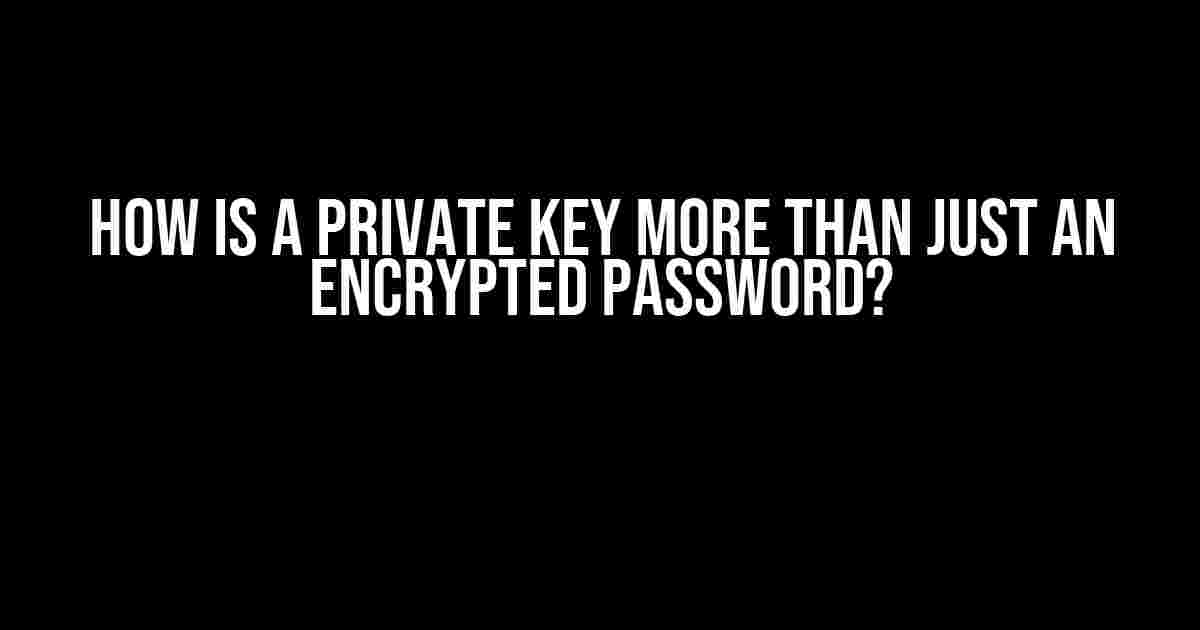A private key is often misunderstood as simply an encrypted password, but it’s much more complex than that. In this article, we’ll delve into the nuances of private keys and why they’re more than just an encrypted password.
What is a Private Key?
A private key is a cryptographic key used to decrypt and authenticate data, messages, or transactions. It’s a unique, secret key used in public-key cryptography, paired with a corresponding public key. Together, they form an asymmetric encryption system.
Differences Between Private Key and Encrypted Password
A private key and an encrypted password are not interchangeable terms. Here are the key differences:
- Encryption vs. Encoding: A private key is used for decryption, whereas an encrypted password is simply encoded using an encryption algorithm. Decryption requires a private key, whereas decoding an encrypted password requires only the encryption algorithm.
- Randomness and Uniqueness: Private keys are generated using random, unique numbers, making them more secure than encrypted passwords, which can be generated using algorithms and may not be as randomly generated.
- Pairing with a Public Key: Private keys are paired with a corresponding public key, enabling secure communication. Encrypted passwords do not have a paired public key.
- Usage and Purpose: Private keys are used for authentication, decryption, and digital signatures. Encrypted passwords are primarily used for access control and authentication.
Why Private Keys are More Secure
Private keys offer advanced security benefits due to their unique properties:
- Higher Entropy: Private keys have higher entropy, making them more resistant to brute-force attacks.
- Asymmetric Encryption: The pairing of a private key with a public key provides an additional layer of security, as the public key can be shared without compromising the private key.
- Secure Data Exchange: Private keys enable secure data exchange between parties, ensuring confidentiality, integrity, and authenticity.
In conclusion, a private key is much more than just an encrypted password. It’s a unique, secret key used in public-key cryptography, offering advanced security benefits and enabling secure communication, authentication, and data exchange.
Frequently Asked Question
Unlock the secrets of private keys and discover why they’re more than just encrypted passwords!
What makes a private key different from a password?
A private key is not just an encrypted password! Unlike passwords, which are used for authentication, private keys are used for decryption and digital signatures. They’re a unique pair of keys, mathematically linked to a corresponding public key, allowing for secure data exchange and verification.
Can I use a password as a private key?
No way, José! While a password can be used to encrypt data, it’s not suitable as a private key. Private keys require advanced cryptographic algorithms and mathematical complexity to ensure secure data exchange. Using a password as a private key would compromise security and put your data at risk!
How is a private key generated?
Private keys are generated using complex algorithms and cryptographic methods, such as RSA or elliptic curve cryptography. These algorithms produce a unique pair of keys, ensuring the private key remains confidential while the corresponding public key is shared freely. Think of it like a digital fingerprint – unique, secure, and tamper-proof!
What happens if I lose my private key?
Oh no! Losing a private key can be disastrous, as it compromises the security of your encrypted data and digital identity. To avoid this, it’s essential to store your private key securely, using methods like encrypted wallets, password-protected files, or hardware security modules. Remember, your private key is like a digital treasure – keep it safe and sound!
Can I use the same private key for multiple purposes?
It’s not recommended, buddy! Using the same private key for multiple purposes increases the risk of key compromise and data breaches. Instead, generate unique private keys for each application, ensuring the maximum level of security and minimizing the attack surface. Think of it like having multiple digital identities – each with its own secret key!


